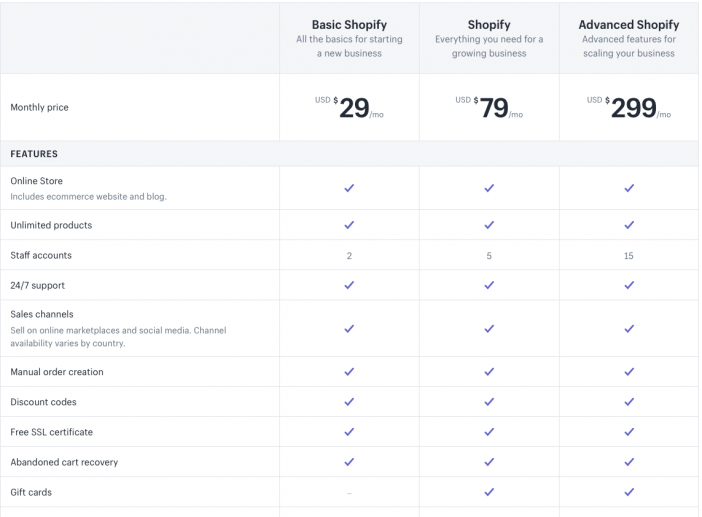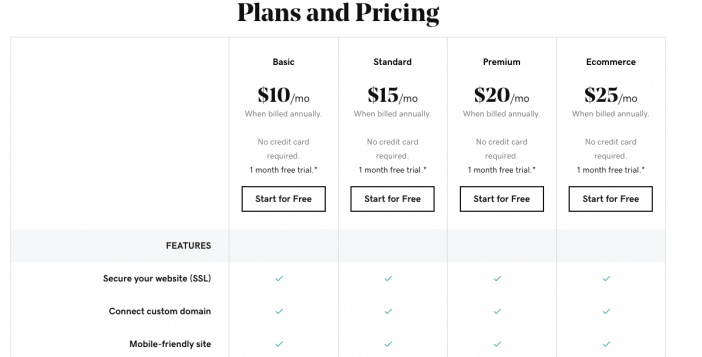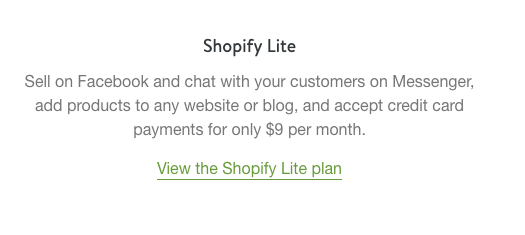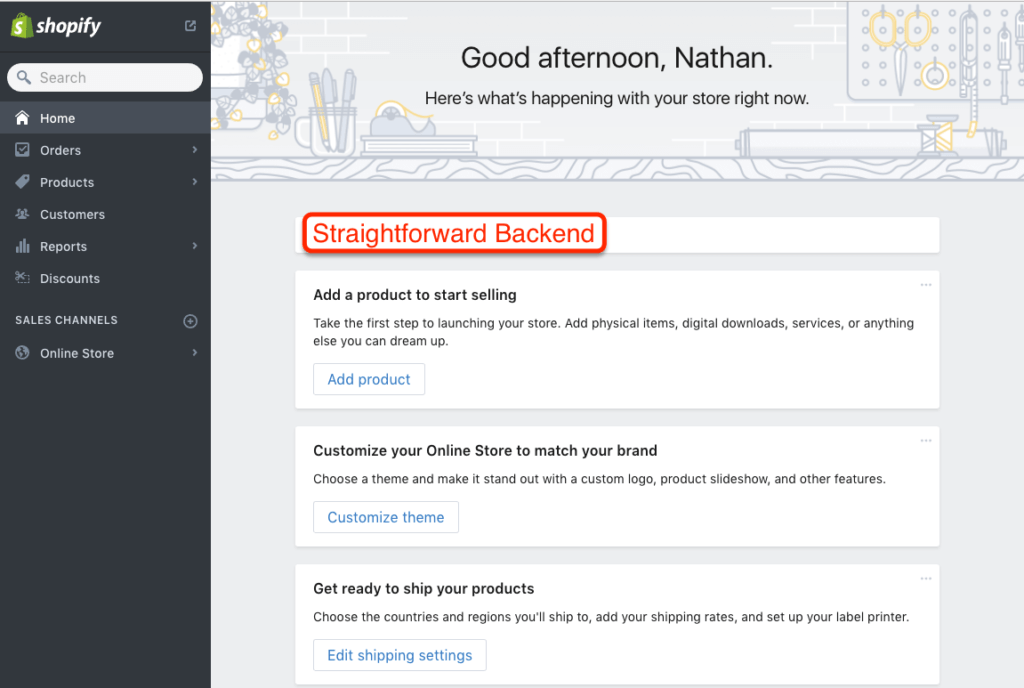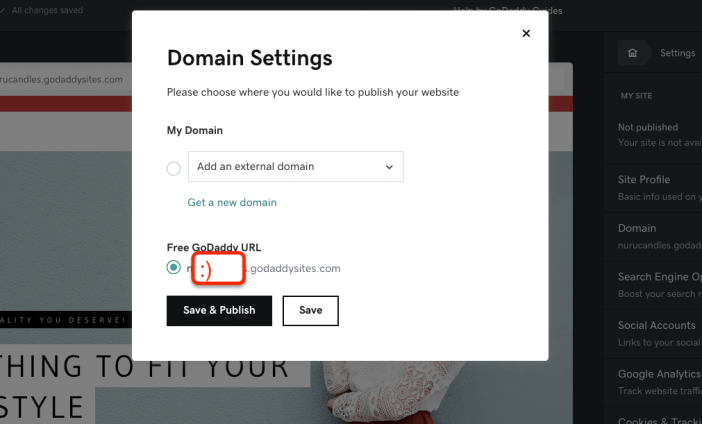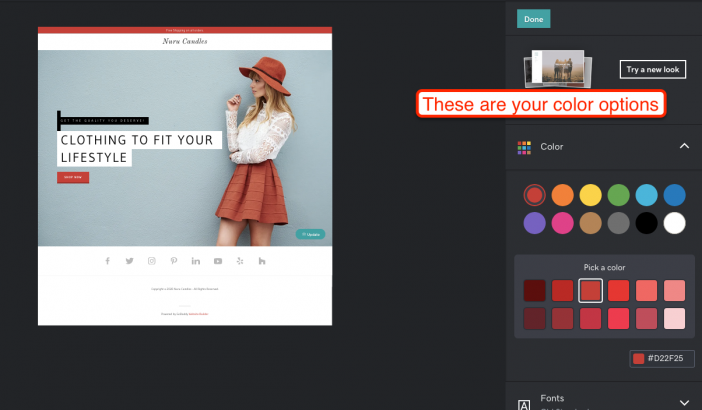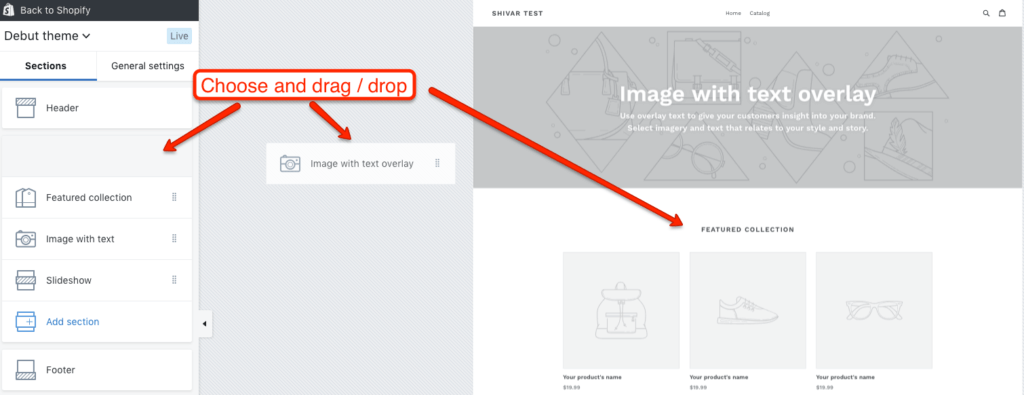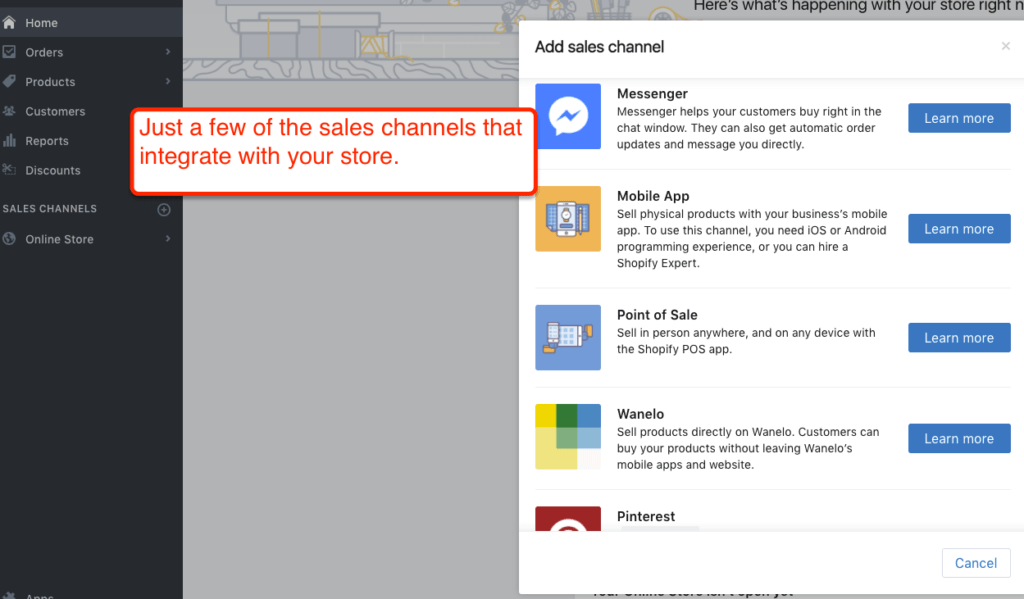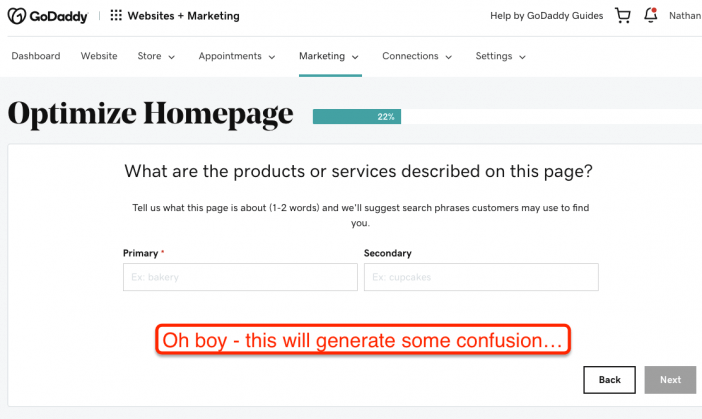GoDaddy vs. Shopify – they are two of the most well-known brands in the website/eCommerce platform industry, and I’ve written a GoDaddy Website Builder Review and Shopify Review respectively, but how do they compare directly to each other?
| Comparisons | GoDaddy | Shopify |
|---|---|---|
| Key Strength | Ease of Setup & Pricing | Features & integrations |
| Key Complaint | Design & functional limitations | Daunting for new users |
| Best for… | Beginners & small stores | Growing eCommerce brand |
| Current Promotion | Start For Free | Start Your Free Trial |


First, a bit of background. Over the past few years, online store costs have plummeted, and the technology to get a website from idea to reality has blossomed. Whether you’re using a text editor and uploading to the Amazon cloud, hosting your own site powered by WordPress + WooCommerce or using a drag and drop online store builder, there’s never been an easier time to create an online store.
All-inclusive eCommerce builders have been particularly interesting. Companies like GoDaddy, Squarespace, Weebly, Wix, and Shopify – not to mention platforms like Etsy, eBay, and Amazon – have brought eCommerce to everyone regardless of their coding skills.
On the wide spectrum of eCommerce store building solutions, they all live on the end that is all-inclusive and provide everything you need to get started and grow your website.
They stand in contrast to solutions where you buy, install and manage all the “pieces” of your website separately (such as web hosting, eCommerce software, custom domain, SSL certificate, etc). While that’s not a good or bad thing, it is something to be aware of when you’re choosing one of them as a solution since it affects your website both long and short term.
In the long-term, it affects your versatility, functionality, and, of course, your brand. In the short term, it can certainly add/take away a lot of headaches. That said, just like choosing a physical house or office, there is no such thing as an absolute “best” or “top” choice. There’s only the right choice relative to your goals, experience, and circumstances.
Using an online store builder is like leasing and customizing an apartment in a really classy development instead of buying and owning your own house. You’re still in control of decor, cleaning, and everything living-wise – but you leave the construction, plumbing, security, and infrastructure to the property owner. That point is key because there’s usually a direct tradeoff between convenience and control.
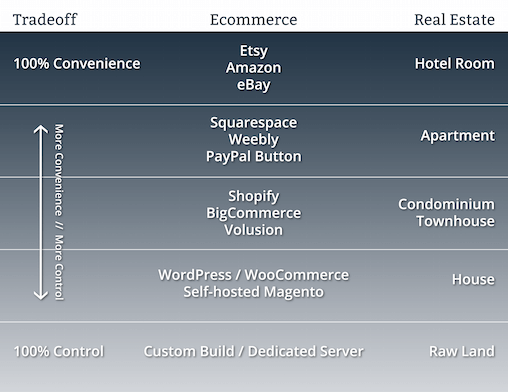
Shopify, GoDaddy’s builder, and other options like Weebly as a group compete with options like WordPress + WooCommerce (which provides the free software to build a website that you own & control – see my WordPress setup guide here) all the way to options like typing actual HTML code into a text file.
There are three last prefaces to straighten out.
First – GoDaddy is an all-around hosted website builder with eCommerce capability.
Second – Shopify, in contrast, is strictly a hosted eCommerce platform. This focus puts GoDaddy Website Builder behind as an advanced tool and Shopify behind as a super-easy-to-use tool. With their respective free trials, you can quickly see the differences.
Third – GoDaddy is a traditional hosting provider without the builder where you can install WooCommerce, Magento or other self-hosted eCommerce software. In this comparison, we’ll look at GoDaddy’s eCommerce website builder product specifically. You can find GoDaddy hosting alternatives here.
Make sense? Awesome – let’s dive into the comparison.
You can also take a look at my other articles:
- Shopify Review
- GoDaddy Website Builder Review
- Shopify vs. Etsy
- Shopify vs. WordPress / WooCommerce
- GoDaddy vs. Wix vs. Weebly
Otherwise, we’ll look specifically at pricing, onboarding/user experience, design features, technical features, eCommerce features, marketing features, and customer support.
Pricing
Comparing pricing between Shopify and GoDaddy Website Builder is tough because they have two very different products. This comes from the fact that Shopify focuses on *only* online store owners whereas GoDaddy markets to everyone.
The short version is that Shopify’s Basic tier is a bit more expensive than GoDaddy’s Website Builder Online Store tier at $29/mo.
That said – Shopify offers many more features on their cheapest plan than GoDaddy does on their most expensive. And that doesn’t even mention that Shopify has additional tiers with even more features for advanced stores.
See GoDaddy’s Website Builder Online Store Plan here.
Pricing is really apples and oranges – or rather like comparing the pricing of a motorcycle vs. an SUV.
Sure, the motorcycle is much cheaper and it gets you from A to B…but it’s a totally different thing altogether.
It all really comes down to what you need for your project – two wheels that will get you where you need to go or a vehicle that has plenty of room along with lots of features. So let’s look at other differences.
Aside – if you’re curious, Shopify’s $9/mo Lite plan isn’t applicable since it’s more of an inventory/payments software than an online store builder software.
You can upload products, manage them, and accept payments, but you can only sell them via other platforms such as a Facebook plugin or a button on an existing website.
GoDaddy vs Shopify on Pricing
With pricing, GoDaddy’s Website Builder is definitely cheaper. And if it meets your goals, then that will absolutely be the most important item. But pricing isn’t the only consideration for everyone. You are probably looking at overall value – so let’s turn to a few other considerations.
Onboarding & User Experience
No matter how intuitive and simple a piece of technology is, there’s always that moment of “what am I looking at and what do I do now?”
Onboarding is the process of guiding you past that point. In theory, a huge selling point of online website/store builders is that they have a near-zero learning curve. They have a straightforward process from website concept to website reality.
User experience is how your customer perceives your product day in and day out – is it intuitive and straightforward?
On this point, GoDaddy’s Website Builder and Shopify both do well but in different ways.
Shopify has a quick path from free trial signup to site launch. They have guided tours and a very straightforward setup. They also have customer support outreach focused on getting you up and running quickly.
However, Shopify also has many more features, apps, and technical options available that can present a challenge. The most daunting hurdle is linking your custom domain name to your store (so it doesn’t use the default Shopify domain). It’s not difficult but is daunting at the mention of “setting your CNAME. Shopify is not a domain registrar, but recently they have added the ability to purchase a custom domain through them and set it up semi-automatically in the Shopify admin.
Since Shopify functions as a platform with Shopify payments, offline inventory and more – their website store setup is actually on the second menu of their main dashboard rather than front and center.
GoDaddy has a ridiculously fast signup to live site process. They have an intuitive setup flow for a GoDaddy online store, plus they have integrated many of their other services (like GoDaddy domain names) into a single GoDaddy account, so there’s simplicity there.
That said, part of the reason that GoDaddy eCommerce is so simple is that it is so limited. It does not have many templates or features to sort through. It’s basically “get your ecommerce plan, add your product, add your domain, add your payment gateway…and publish!” type setup.
I would not rule either provider out on onboarding/user experience. But their differences are sort of like a restaurant with a waiter (Shopify) vs. a fast food restaurant with a menu above the cashier (GoDaddy).
GoDaddy vs Shopify on Usability
If you want more help and more customization, then Shopify is your choice. If you want to quickly see and order from the features, then GoDaddy is less daunting, but also more limiting.
Design Features
Part of the overall value of website builders is a simple, straightforward design – no web designers necessary. You choose well-made templates and customize them to your fit.
But good design is hard. And it matters – a lot. A lot of people can spot a good-looking website but have a harder time figuring out how to get there. Using a template for a foundation and then customizing it is a good way to get the site you want without paying for a custom design.
Both Shopify and GoDaddy use templates (aka “themes”) for design. But they are very different in customization options.
GoDaddy has many pre-filled templates for every website imaginable.
But – they are pretty locked down for editing. There is no drag and drop website builder. There is no HTML/CSS editing. There’s very little editing to be done at all. Your images and content are the only things you have to work with.
Shopify does not combine design and content. A Shopify theme uses pre-built templates but your Shopify template has to be edited via CSS or their proprietary Liquid HTML drag and drop editing tool.
However, since you can edit HTML/CSS with Shopify, you can build any design possible. There are few, if any, limits to any design that you see on the Internet. Additionally, Shopify has a drag and drop template editor to change your layout and template within some limits.
Using themes & pre-packaged theme files allows anyone to choose and use a beautiful web design that can be edited if you are comfortable with HTML/CSS.
GoDaddy vs Shopify on Design
In short, GoDaddy goes for ease of use & convenience with design features. Shopify goes for full customization options while maintaining some ease of use.
eCommerce Functionality
The absolute core features of an eCommerce store are a
- product database
- shopping cart
- checkout page
- payment processor
- order database
That is it.
But, especially in 2020, there is a *lot* more than can (and should) go into an eCommerce store. There’s everything from selling via Facebook Messenger to syncing with Amazon FBA to integrating with eBay to analyzing Pinterest trends – not to mention features for executing on marketing fundamentals.
Even for advertising products, there’s selling via Buyable Pins, Google Merchant, Twitter cards, and more. There’s remarketing and there are coupon codes. There’s A/B testing. There’s inventory synchronization with vendors like AliExpress. And there’s order synchronization with shippers like UPS and USPS.
And that’s all a drop in the bucket to what is possible.
Obviously, not every store needs every feature. If you are trying to sell a couple of T-shirts or a few specialty products – you certainly don’t need them all. But if you want to grow and expand, you’ll need to keep your options open.
On raw eCommerce features, Shopify wins hands down. GoDaddy does make it simple to sell your product. GoDaddy has the core features needed, but nothing to build a rapidly growing store.
Shopify not only has more features directly integrated into their platform, but they also have a well-established app store that includes free and paid apps to extend your store with every feature you could possibly need.
That said, this section is a bit unfair to GoDaddy, because, again, they are a general website builder that includes eCommerce. Shopify is strictly an eCommerce platform.
If Shopify didn’t “win” on eCommerce features it would be a surprise. Technically, GoDaddy competes more with Wix & Weebly than with Shopify.
In fact, this review is remarkably similar to my comparison between Shopify vs. Wix – Wix, as a website builder first, has nearly the exact same issues (though with different details) as GoDaddy.
GoDaddy vs Shopify on Ecommerce Features
In short – if you only need core eCommerce features integrated in a simple, straightforward way, then GoDaddy is great. If you actually need a full suite of eCommerce features to grow, then Shopify is hands-down better.
Technical Features
Technical features are all the web development best practices that don’t really “matter”…until they matter a lot. I’m talking about generating clean URLs, editable metadata, allowing page-level redirects, etc.
On this point, Shopify does very well – and not just compared to GoDaddy, but compared to any hosted platform.
Traditionally, hosted platforms have presented a risk for web designers, developers, and marketers who wanted to work on the technical aspects of the site.
What really sells Shopify to many skeptics of hosted platforms is that they actually take care of the technical features (like unlimited bandwidth) well. You still don’t have FTP access to your server, but you do have access to change things via their Liquid editor.
But Shopify doesn’t just have a solid technical foundation, they also do a lot to stay on the cutting edge. They pay a bounty for bugs and security exploits. They can roll out changes like global SSL to all stores quickly.
Lastly, Shopify has an open & actively maintained API that GoDaddy does not have. An API is a very advanced feature that’s usually ignored by typical store owners. But the availability of an API has big implications – think of it as a common language that allows any piece of software to “talk” to any other software. It means that if you start growing and want custom features – you can do that. A developer can build a custom application to link any software to your Shopify store. They have a large Shopify App Store in addition to a Shopify POS system and other ecommerce tools.
GoDaddy has no FTP access at all and has no way to edit the technical portions of their site – including things as basic as data gathering or retargeting or advanced analytics.
GoDaddy vs Shopify on Technical Features
Both GoDaddy and Shopify have inherent limitations as hosted platforms, but Shopify does a lot more to eliminate the weaknesses and capitalize on strengths as a hosted platform.
Marketing Features
In Field of Dreams, Kevin Costner’s character says “if you build it, they will come.” Sadly, that is not true for websites. Like any business, you have to actively promote and market your online store for anyone to show up.
Marketing features like custom metadata, open graph information, Schema markups, email signups, share buttons, landing pages, etc all make marketing your site a lot easier.
But like design & eCommerce features, there’s really no comparison. For an eCommerce store owner, Shopify has many more (and higher quality) built-in features plus a better, more developed app store.
GoDaddy has some built-in features, but many are simply used as an upsell – or do not provide store owners what they truly need.
For example, their SEO feature set provides (seemingly) good direction on writing title tags.
But then misleads customers on what truly matters for SEO (like having a good keyword strategy, writing good content, and figuring out what topics actually lead to sales). The emphasis is on the outdated notion of “keyword rankings.“
And the tool makes guarantees that simply can’t be met without an actual eCommerce strategy.
GoDaddy vs Shopify on Marketing Features
All that to say – using GoDaddy will not hurt your marketing efforts, but it will certainly cap them if you focus on digital marketing. If your store relies on offline or other marketing methods – then this might not be an issue. But – it is something to be aware of.
Support & Service
Customer support and service are difficult to judge. Like I’ve said in most of my reviews, a single customer can never really know if they happened upon a disgruntled rookie or if the company is really that bad.
That said, there are ways to look at a company’s investment in both customer services and support.
For GoDaddy vs. Shopify, I think the clear “winner” is Shopify. Shopify not only provides more channels for customer service (phone, chat, email, forums, social media, etc), they also have an incredibly extensive help center.
The help center not only tackles technical issues, but it also tackles customer success issues (aka problems with making money).
GoDaddy has phone support and other support channels, but their channels, while helpful, are often opportunities for upselling.
Who Is The Better Ecommerce Website Builder?
So GoDaddy Website Builder vs. Shopify – which one is a better fit for your project?
If you plan on running a growing eCommerce store and want all the features possible, then you should go try Shopify. There’s really no comparison.
If you want a simple store with solid templates, then GoDaddy might be a good fit. That said, in my experience with other online store builders, I think there are better options. I’d recommend taking my online store builder quiz to find the best fit.
Also – bookmark my post on creating an eCommerce marketing strategy here.
Good luck!
